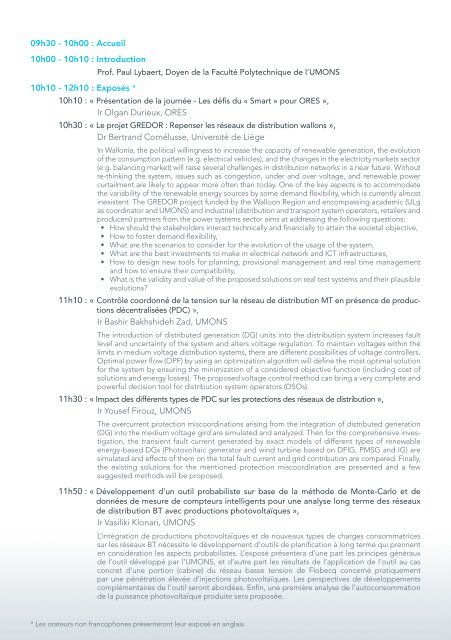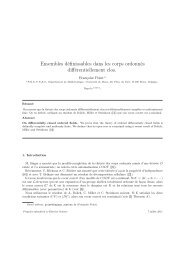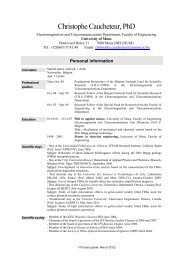Program - Université de Mons
Program - Université de Mons
Program - Université de Mons
You also want an ePaper? Increase the reach of your titles
YUMPU automatically turns print PDFs into web optimized ePapers that Google loves.
09h30 - 10h00 : Accueil<br />
10h00 - 10h10 : Introduction<br />
Prof. Paul Lybaert, Doyen <strong>de</strong> la Faculté Polytechnique <strong>de</strong> l’UMONS<br />
10h10 - 12h10 : Exposés *<br />
10h10 : « Présentation <strong>de</strong> la journée - Les défis du « Smart » pour ORES »,<br />
Ir Olgan Durieux, ORES<br />
10h30 : « Le projet GREDOR : Repenser les réseaux <strong>de</strong> distribution wallons »,<br />
Dr Bertrand Cornélusse, <strong>Université</strong> <strong>de</strong> Liège<br />
In Wallonia, the political willingness to increase the capacity of renewable generation, the evolution<br />
of the consumption pattern (e.g. electrical vehicles), and the changes in the electricity markets sector<br />
(e.g. balancing market) will raise several challenges in distribution networks in a near future. Without<br />
re-thinking the system, issues such as congestion, un<strong>de</strong>r and over voltage, and renewable power<br />
curtailment are likely to appear more often than today. One of the key aspects is to accommodate<br />
the variability of the renewable energy sources by some <strong>de</strong>mand flexibility, which is currently almost<br />
inexistent. The GREDOR project fun<strong>de</strong>d by the Walloon Region and encompassing aca<strong>de</strong>mic (ULg<br />
as coordinator and UMOnS) and industrial (distribution and transport system operators, retailers and<br />
producers) partners from the power systems sector aims at addressing the following questions:<br />
• How should the stakehol<strong>de</strong>rs interact technically and financially to attain the societal objective,<br />
• How to foster <strong>de</strong>mand flexibility,<br />
• What are the scenarios to consi<strong>de</strong>r for the evolution of the usage of the system,<br />
• What are the best investments to make in electrical network and ICT infrastructures,<br />
• How to <strong>de</strong>sign new tools for planning, provisional management and real time management<br />
and how to ensure their compatibility,<br />
• What is the validity and value of the proposed solutions on real test systems and their plausible<br />
evolutions?<br />
11h10 : « Contrôle coordonné <strong>de</strong> la tension sur le réseau <strong>de</strong> distribution MT en présence <strong>de</strong> productions<br />
décentralisées (PDC) »,<br />
Ir Bashir Bakhshi<strong>de</strong>h Zad, UMOnS<br />
The introduction of distributed generation (DG) units into the distribution system increases fault<br />
level and uncertainty of the system and alters voltage regulation. To maintain voltages within the<br />
limits in medium voltage distribution systems, there are different possibilities of voltage controllers.<br />
Optimal power flow (OPF) by using an optimization algorithm will <strong>de</strong>fine the most optimal solution<br />
for the system by ensuring the minimization of a consi<strong>de</strong>red objective function (including cost of<br />
solutions and energy losses). The proposed voltage control method can bring a very complete and<br />
powerful <strong>de</strong>cision tool for distribution system operators (DSOs).<br />
11h30 : « Impact <strong>de</strong>s différents types <strong>de</strong> PDC sur les protections <strong>de</strong>s réseaux <strong>de</strong> distribution »,<br />
Ir Yousef Firouz, UMOnS<br />
The overcurrent protection miscoordinations arising from the integration of distributed generation<br />
(DG) into the medium voltage gird are simulated and analyzed. Then for the comprehensive investigation,<br />
the transient fault current generated by exact mo<strong>de</strong>ls of different types of renewable<br />
energy-based DGs (Photovoltaic generator and wind turbine based on DFIG, PMSG and IG) are<br />
simulated and effects of them on the total fault current and grid contribution are compared. Finally,<br />
the existing solutions for the mentioned protection miscoordination are presented and a few<br />
suggested methods will be proposed.<br />
11h50 : « Développement d’un outil probabiliste sur base <strong>de</strong> la métho<strong>de</strong> <strong>de</strong> Monte-Carlo et <strong>de</strong><br />
données <strong>de</strong> mesure <strong>de</strong> compteurs intelligents pour une analyse long terme <strong>de</strong>s réseaux<br />
<strong>de</strong> distribution BT avec productions photovoltaïques »,<br />
Ir Vasiliki Klonari, UMOnS<br />
L’intégration <strong>de</strong> productions photovoltaïques et <strong>de</strong> nouveaux types <strong>de</strong> charges consommatrices<br />
sur les réseaux BT nécessite le développement d’outils <strong>de</strong> planification à long terme qui prennent<br />
en considération les aspects probabilistes. L’exposé présentera d’une part les principes généraux<br />
<strong>de</strong> l’outil développé par l’UMOnS, et d’autre part les résultats <strong>de</strong> l’application <strong>de</strong> l’outil au cas<br />
concret d’une portion (cabine) du réseau basse tension <strong>de</strong> Flobecq concerné pratiquement<br />
par une pénétration élevée d’injections photovoltaïques. Les perspectives <strong>de</strong> développements<br />
complémentaires <strong>de</strong> l’outil seront abordées. Enfin, une première analyse <strong>de</strong> l’autoconsommation<br />
<strong>de</strong> la puissance photovoltaïque produite sera proposée.<br />
* Les orateurs non francophones présenteront leur exposé en anglais.






